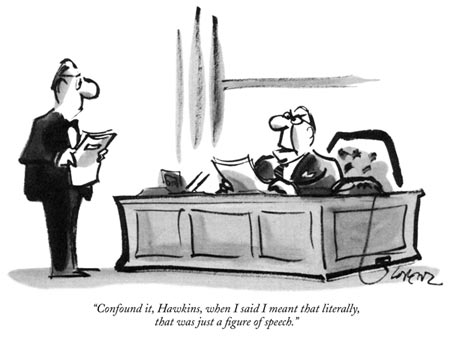
In recent years, the word “literally” has been overused.
Traditionally, the word “literally” means “exactly as stated, not figuratively.” However, pop culture has twisted it into an intensifier. Under the correct meaning, saying “it’s literally raining cats and dogs” means that animals are falling from the clouds, but many people use it to describe heavy rain.
This mistake escalated to the point where dictionaries like Merriam-Webster define “literally” as an autoantonym, a word with two opposite meanings. It can either mean “not figuratively,” or a synonym to “figuratively”.
Modern culture cannot be blamed for starting this trend. A 1837 article used the phrase “they both literally slept in Jesus” incorrectly. Writers like Mark Twain and Charles Dickens are equally guilty.
It’s easy for such a shift to happen. The French have created the Académie française, an organization that regulates proper usage. American English has no such authority, and is exposed to descriptive changes.
The mistreatment of “literally” is different than correcting someone for using “it’s” instead of “its” when no confusion is present. Literally serves a legitimate purpose that has been muddled.
With dictionaries recognizing the new usage of the word literally, there is a chance “literally” will become another intensifier, like “very.” The original meaning might become obsolete.
Should linguists surrender on this front? No.
However, one must be careful not to become pedantic. It’s not worth breaking social etiquette to gripe about someone saying “I ate so much that my head literally exploded!” Instead, the topic can be conversed.
One problem is that it’s not worth dedicating an entire movement towards the usage of a single word. It’s too trivial. Instead, spread awareness about all autoantonyms, and language in general.
The problem is also rooted in the use of filler words and not thinking about word choice while talking. This could be solved if everyone could think a bit more in depth while verbalizing thoughts. This would give the English language more purpose, instead of adding more careless slang.
Even if it’s too late to correct “literally,” the world will not end. However, we can all still support thoughtful language. Unless animals are actually dropping from the sky, don’t say that it’s raining cats and dogs.







